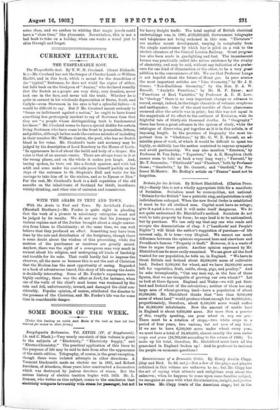SOME BOOKS OF THE WEEK.
[17nder this heading we notice such Books of the week as have not been reserved for review in other forms.] Encyclopedia Britannica. Vol. XIVIII. (IV. of Supplement). (A. and C. Black.)—Very nearly one-sixth of this volume is given to the subjects of "Electricity," " Electricity Supply," and " Electro-Chemistry." The practical application of this force to the purposes of life may be said to date from after the appearance of the ninth edition. Telegraphy, of course, is the great exception, though there were isolated attempts in other directions. A Vermont blacksmith made an electric car in 1885, and Robert Davidson, of Aberdeen, three years later constructed a locomotive which was destroyed by jealous devotees of steam. But the serious history of electric traction begins with 1879. Mr L. Duncan, who writes on this subject, comes to the conclusion that electricity compares favourably with steam for passenger, but not for heavy freight traffic. The total capital of British electrical undertakings was, in 1890, £123,636,602, Government telegraphs and telephones not being reckoned in this sum. " Elevators " are another recent development, varying in complexity from the simple contrivance by which hay is piled on a rick to the electric elevators of the Central London Railway. Great progress has also been made in gas-lighting and fuel. The incandescent burner was practically called into active existence by the rivalry of electricity, and may be said, without any indication of a prefer- ence for one kind of illumination or the other, to be a very great addition to the conveniences of life. We see that Professor Lunge is not hopeful about the future of Mond gas. In pure science the most important articles are " Line Geometry," by Mr. J. B. Grace ; "Non-Euclidean Geometry," by the. Hon. B. A. W. Russell; "Analytic Functions," by Mr. H. F. Baker; and "Functions of Real Variables." by Professor A. E. H. Love. In " Geology " there is no very important change or advance to record, except, indeed, in the tragic chronicle of volcanic eruptions and earthquakes. One of the most terrible of these phenomena occurred after the article was in print; but this was not equal in the magnitude of its effect to the outburst of Krakatoa, with its frightful tale of thirty-six thousand deaths. In " Geography" there has been a great advance in the system of study, while the catalogue of discoveries, put together as it is in this article, is of imposing length. In the province of biography the most im- portant item is " Gladstone," by Mr. G. W. E. Russell, an ad- mirable piece of work, of which it would be difficult to speak too highly, so skilfully has the author contrived to express sympathy and avoid partisanship. We may also mention " Emerson," by Professor H. Van Dyke ; " Espartero," by A. E. Houghton (both names seem to take us back a very long way) ; " Fawcett," by Mr. T. Seccombe; " FitzGerald" and " Flaubert," both by Professor Gosse ; " Gambetta," by Dr. Garnett; and " Garfield," by Pro- fessor McMaster. Mr. Bodley's article on "France" must not be forgotten.


































 Previous page
Previous page